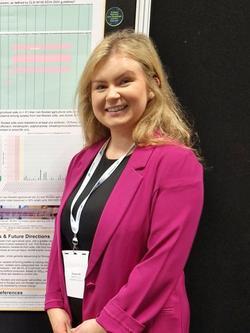Meet Early Career Microbiologist of the Year poster finalist: Shauna O'Shea

What are your current research interests?
The focus of my current research is bacterial antimicrobial resistance through a One Health lens. My current work investigates the influence that flooding, due to climate change, is having on the presence of potentially pathogenic bacteria within the environment. Our project is interested in the transmission of pathogenic bacteria from flooded soils into drinking water sources. Part of this research is also concerned with testing novel methods to inhibit the spread of AMR in the environmental realm, to (hopefully one day) protect animal and human health.
How do Society events, such as Annual Conference, promote your professional development?
Microbiology Society events provide opportunities to engage with a wide network of individuals who share a collective interest. Society events have given me the opportunity to share some of my research and have engaging conversations with others, some of whom sparked new ideas! Events such as Annual Conference, where I have been fortunate to present have given me much-needed experience in science communications. Over the past couple of years, I have been lucky to form networks with experienced and early-career microbiologists from a diverse range of backgrounds. Society events also allow for the opportunity to learn about areas of microbiology that I wouldn’t normally hear about! Being part of the Society gives the opportunity to apply for travel grants, making event attendance more accessible.
What inspired you to go into this field of work?
My route to research has been slightly atypical, but one I am grateful for. I previously worked as a general nurse in an orthopaedic unit in Ireland and decided to get a Master’s Degree in Immunology and Global Health from Maynooth University. It was here during my Summer Research Project that I was introduced to my current supervisor and area of research. I was meant to be there for a few weeks... three years later and I’m still there! Health and disease have always been an area of interest to me and after working in the clinical environment, seeing first first-hand the devastating impacts of bacterial AMR has given me a passion for this area of research.
How did you feel finding out you are an Early Career Microbiologist of the Year finalist?
Genuinely shocked and overwhelmed, I feel very fortunate to have this opportunity (huge thank you to the Microbiology Society and the judges!). The standard of ongoing research at the Microbiology Society Annual Conference this year was so high, that it never even crossed my mind I might be in with a chance. When I entered the competition, I did it for the experience and to push myself outside my comfort zone… I hadn’t anticipated I’d be lucky enough to become a finalist!
What advice would you share with someone interested in working in this field?
I’d highly recommend finding an area of microbiology that piques your interest and that you are passionate about. Seek out supervisors who work within the field and reach out to them. Take all the opportunities that come your way and push yourself outside of your comfort zone – especially when it feels daunting! Find a supportive supervisor and build a good support network around yourself, research can be challenging, so you need good people around you. Take the time to get to know other researchers, and forge networks and friendships – this can also lead to future opportunities for collaboration.
You can find and follow Shauna on X (formerly known as Twitter): @ShaunaOShea21
